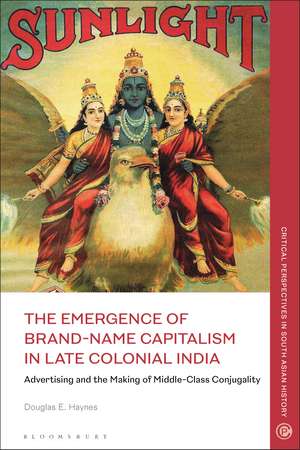The Emergence of Brand-Name Capitalism in Late Colonial India: Advertising and the Making of Modern Conjugality: Critical Perspectives in South Asian History
Autor Douglas E. Haynesen Limba Engleză Paperback – 17 apr 2024
| Toate formatele și edițiile | Preț | Express |
|---|---|---|
| Paperback (1) | 193.70 lei 6-8 săpt. | |
| Bloomsbury Publishing – 17 apr 2024 | 193.70 lei 6-8 săpt. | |
| Hardback (1) | 567.99 lei 3-5 săpt. | |
| Bloomsbury Publishing – 19 oct 2022 | 567.99 lei 3-5 săpt. |
Preț: 193.70 lei
Preț vechi: 250.64 lei
-23% Nou
Puncte Express: 291
Preț estimativ în valută:
37.06€ • 38.91$ • 30.76£
37.06€ • 38.91$ • 30.76£
Carte tipărită la comandă
Livrare economică 10-24 aprilie
Preluare comenzi: 021 569.72.76
Specificații
ISBN-13: 9781350278073
ISBN-10: 1350278076
Pagini: 328
Ilustrații: 90 bw illus
Dimensiuni: 156 x 234 x 25 mm
Greutate: 0.46 kg
Editura: Bloomsbury Publishing
Colecția Bloomsbury Academic
Seria Critical Perspectives in South Asian History
Locul publicării:London, United Kingdom
ISBN-10: 1350278076
Pagini: 328
Ilustrații: 90 bw illus
Dimensiuni: 156 x 234 x 25 mm
Greutate: 0.46 kg
Editura: Bloomsbury Publishing
Colecția Bloomsbury Academic
Seria Critical Perspectives in South Asian History
Locul publicării:London, United Kingdom
Notă biografică
Douglas E. Haynes is Professor of South Asian History at Dartmouth College, USA. His publications include Rhetoric and Ritual in Colonial India (California, 1991) and Small-Town Capitalism in Western India (Cambridge, 2012). He has co-edited four other books and has written extensively on business and economic history, sexual science and advertising in western India.
Cuprins
List of Illustrations Preface Acknowledgements Abbreviations Introduction 1. Brand-name Capitalism and Professional Advertising in India 2. Consumers: European Expatriates and the Indian Middle Class 3. Tonics and the Marketing of Conjugal Masculinity 4. Advertising and the Female Consumer: Feluna, Ovaltine and Beauty Soaps 5. Lever Brothers, Soap Advertising, and the Family6. The Invention of a Cooking Medium: Cocogem and Dalda 7. Electrical Household Technologies: Fracturing the Ideal Home Chapter VIII: Conclusion: Interwar Advertising and India's Contemporary....................... Bibliography Index
Recenzii
A landmark contribution in the history of global capitalism, Haynes crafts an aesthetic visual archive of the modern professional advertising world in colonial western India. The book's phenomenal textual analysis of advertisements in various languages and cities is indispensable for scholarship on urban middle classes, modern conjugality, gender relations, consumption practices, masculinities, medicine and sexual sciences.
By showing how advertisements for consumer products drew upon and reinforced ideas about family and conjugality, Haynes connects the history of business with the making of a middle class in India. This is a path-breaking book, not least for the novel material analysed with insight and elegance.
In this rich cultural history, Haynes traces how advertisers in India interwove global commodity trends and localized concerns, responding to and shaping new ideas of gender and family. Where other scholars have analyzed individual ads to explore ideas of health, modernity or class, Haynes draws out in compelling detail where and why ads took the form they did, connecting culture and commerce, capital and politics.
By showing how advertisements for consumer products drew upon and reinforced ideas about family and conjugality, Haynes connects the history of business with the making of a middle class in India. This is a path-breaking book, not least for the novel material analysed with insight and elegance.
In this rich cultural history, Haynes traces how advertisers in India interwove global commodity trends and localized concerns, responding to and shaping new ideas of gender and family. Where other scholars have analyzed individual ads to explore ideas of health, modernity or class, Haynes draws out in compelling detail where and why ads took the form they did, connecting culture and commerce, capital and politics.







